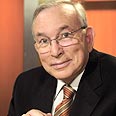
Yaron London
צילום: יהונתן דייויס
Prayer for a longer life
A recent study found that those who regularly go to synagogue live longer. But statistics can be made to show many things
A recently published research study found that those who regularly visit the synagogue live longer than those who do not. This finding falls in line with the fact that the average lifespan of a Bnei Brak resident is one of the highest in the country.
Given that the citizens of this haredi city spend much of their time praying in synagogue, the combination of these two findings is likely to strengthen the conclusion that God rewards those who serve their lord with a long life.
If it can be proved that going to synagogue is a recipe for long life, then many full-fledged heretics will reconsider their attitude to public prayer, and from here lies the path to mass repentance.
But statistics is a science that fools those who don't understand it. Almost any statistic, taken out of its wider context, is likely to mislead. For example, if Israel's life expectancy is one of the highest in the world, then what about the idol-worshipping Japanese, whose life expectancy is greater?
From this it is clear that the proportion of those who pray to God is not the only variable that influences life expectancy. Hereditary factors, nutrition and the quality of available health services also, it seems, play their part.
And yet, there is something in the finding that connects a long life with frequent visits to the synagogue. On the face of it, it contradicts the known statistical correlation between longevity and a high standard of living and well-rounded education, because it is the completely secular among us who stay away from synagogue, who are the best-educated and richest group in the population.
Secular people have smaller families, and have wider use of expensive medical facilities. They live in less crowded conditions and are more health conscious.
In comparison, the haredim, who spend more time in synagogue than others, are at the bottom of the socio-economic scale. They have large families, have less money to spend on doctors and medicine and they are less health-conscious, both for themselves and their children.
So how does one explain the contradiction between "quality of life", as measured statistically, and the findings concerning life expectancy? The explanation lies in the fact that both the spiritual and social side of life influence longevity.
A clear and proven connection has been found between family stability and good health, between good health and the feeling of security provided by living in a supportive society, between a stable way of life, between a person not encumbered by doubts, between a belief in a supreme power that controls fate, between a routine life filled with obligatory customs. The person for whom the synagogue is the source of their social life enjoys all these factors.
But it's not that simple. The population sector whose life expectancy is the shortest in Israel is Israel's Muslim Arab sector. They share most of the above factors with the haredim, but they are less-well educated, their economic deprivation is greater, they have even less health-care access than the haredim and their lives are full of stress and worry.
And another assumption: a sixth of Israel's population are immigrants, who arrived here over the last 20 years. Most of them are secular, and around half have never stepped foot inside a synagogue.
The standard of living of immigrants is lower than that of their native-born counterparts of a similar standard of education. Their life expectancy is lower, perhaps because of the lower standard of health care in their mother country, and because of the harsh immigration experience. Meanwhile, most of those who regularly pray in synagogue are native-born Israelis, well-rooted in the country.
So what conclusions can we draw from this "pilpul" on statistics? Perhaps it's that time spent on praying in synagogue is not a proven way to increase one's lifespan. But at the same time, this does not stop one from doing so for other reasons.










